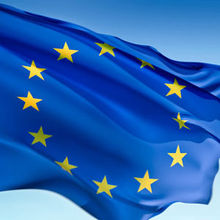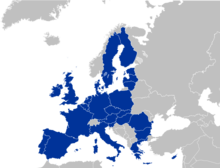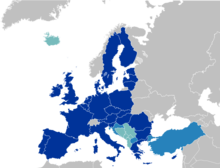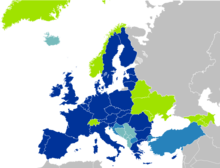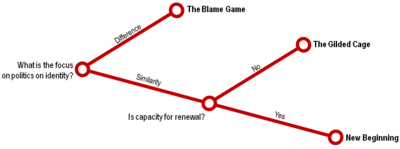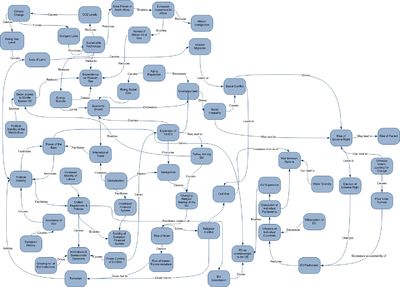Difference between revisions of "Future of the European Union in 2030"
GudmunudurKr (talk | contribs) |
GudmunudurKr (talk | contribs) |
||
| Line 6: | Line 6: | ||
* [[Sri Hari Krishnan]] <br/> | * [[Sri Hari Krishnan]] <br/> | ||
==Introduction== [[Image:EUFlag.jpg|thumb|The Flag of the European Union|220px]] [[Image:EUMap.png|thumb|European Union 2009|220px]] [[Image:EUCandidatecCountries.png|thumb|Candidate countries|220px]] [[Image:LikelyFutureEnlargements.png|thumb|Likely Future Enlargements|220px]] | ==Introduction== | ||
[[Image:EUFlag.jpg|thumb|The Flag of the European Union|220px]] [[Image:EUMap.png|thumb|European Union 2009|220px]] [[Image:EUCandidatecCountries.png|thumb|Candidate countries|220px]] [[Image:LikelyFutureEnlargements.png|thumb|Likely Future Enlargements|220px]] | |||
The European Union was formally established when the Maastricht Treaty came into force on 1 November 1993. It was based on the foundations of earlier treaties made after the second world war in order to integrate the continent and escape from the extreme forms of nationalism which had caused devastating war in the first half of the 20th Century. Over time the EU has grown to become much more than a peace treaty or trade agreement. Its creation has enabled a single market through a standardized system of laws which apply in all member states, ensuring the freedom of movement of people, goods, services, and capital. The common currency of the Euro has grown in power and many consider it to be the replacement of the dollar as the world's reserve currency.<br\> | The European Union was formally established when the Maastricht Treaty came into force on 1 November 1993. It was based on the foundations of earlier treaties made after the second world war in order to integrate the continent and escape from the extreme forms of nationalism which had caused devastating war in the first half of the 20th Century. Over time the EU has grown to become much more than a peace treaty or trade agreement. Its creation has enabled a single market through a standardized system of laws which apply in all member states, ensuring the freedom of movement of people, goods, services, and capital. The common currency of the Euro has grown in power and many consider it to be the replacement of the dollar as the world's reserve currency.<br\> | ||
Revision as of 13:35, 3 October 2009
Team Composition
Introduction
The European Union was formally established when the Maastricht Treaty came into force on 1 November 1993. It was based on the foundations of earlier treaties made after the second world war in order to integrate the continent and escape from the extreme forms of nationalism which had caused devastating war in the first half of the 20th Century. Over time the EU has grown to become much more than a peace treaty or trade agreement. Its creation has enabled a single market through a standardized system of laws which apply in all member states, ensuring the freedom of movement of people, goods, services, and capital. The common currency of the Euro has grown in power and many consider it to be the replacement of the dollar as the world's reserve currency.<br\>
However, current world events have put the union under severe stress. Many factors ranging from the financial crisis to the EU's growing energy dependency and the inclusion of Turkey into the Union are causing disturbances and necessitating decisions which will have far reaching consequences on its future. This scenario project is an attempt to utilize these and several other uncertainties to create three very different futures for the EU.
Research Questions
EU & Europe Definitions
- What is the definition of Europe?
- What countries are part of the European Union?
- What is the history of the European Union?
- What are the candidate countries that want to be part of the European Union?
- What is the euro zone?
Politics
- How is the European Union Governed?
- What are the main bodies of the EU?
- How is the European parliament elected?
- How is the European parliament structured?
- How do the countries work together?
- How does the EU take decisions?
- How does the EU tick?
- How is the EU budget managed?
- What is the main driver for the EU expansion?
- Will the expansion of the EU now come to a halt?
- Is public opinion in the EU in favour of more enlargement?
Policy
- What are the Agriculture policies of the EU?
- What are the Energy policies of the EU?
- What are the Infrastructure policies of the EU?
- What are the Regional policies of the EU?
- What are the Environment policies of the EU?
- What are the Educational policies of the EU?
- What are the foreign policies of the EU?
Environment
Economics
- What is the GDP and Growth Rate of the EU?
- How is monetary policy governed within the EU?
- What can cause the instability of the Euro?
- What are trade statistics for the EU?
- What is the energy profile of the EU?
Society
- Does European Union really bond its members together?
- How do European inhabitants feel about EU?
- What are the immigration trends to EU for EU and Non-EU citizens?
Terrorism
- What has been the impact of terrorism on the EU?
- How the recent rebirth of radical nationalist movements influences the EU?
- European countries are fighting against terrorism but, what about separatist groups like IRA and ETA?
Demographics
- What is the population of the EU and how is it distributed?
- What are the main religions practiced in the EU?
- What are the main languages spoken in the EU?
- What are other key demographic statistics for the EU?
- What is the level of immigration and emigration?
- What are the main issues with changing religion makeup of Europe?
Geopolitics
- Do non EU countries prefer to deal with EU or to deal directly with individual members?
- Enlargement of EU?
- The future of European Union: Managing Globalization
- The future of European Union: Future Trends
- Can the EU disintegrate like the USSR?
- EU and Asia?
- EU and India?
- EU and China?
- EU and Japan?
- EU and South Korea?
- EU and US?
- EU and Canada?
- EU and Africa?
- EU and Latin America?
- EU and Russia?
- EU and Middle East?
- What if Primakov's triangle becomes a reality?
Driving Forces
Political Driving Forces
- Political Stability in Europe
- Institutional & Bureaucratic Dynamics
- To be a world power house
- Economic Success
- Turkey Joining the EU
- Movement Towards World Unification
- Islamic Fundamentalism
- Terrorism
Technological Driving Forces
Environmental Driving Forces
- Interests of lesser developed member states and the cost of subsidizing their practices
- Pressure from developing countries
- Effects of climate change
Economic Driving Forces
Societal Driving Forces
Scenarios
These are the four scenarios that are likely to be the future of Europe in 2030. Included are two diagrams that indicate our train of thought when trying to come to these scenarios. Each scenario consist of a story that tell about how the future looks in 2030. Following that comes a section that gives all background information, illustrating in detail how this future came to be.
Inference matrix
| The Blame Game | New Beginning | The Gilded Cage | |
|---|---|---|---|
| Governance | Central (Brussels) | Network | |
| Economy | Recession | Fast Growth | Slow Growth |
| Identity | Inward | Outward | |
| Immigration | Closed Border | Open Border | As is |
| Boundary | Break Up | Expansion | Slow Decline |
| Financial | System Socialism | Mix | Capitalism |
| Culture | Traditional | New | Mix |
| Commerce/Trade | Restricted | Free | Free |
| Resources/Energy | Oil&Gas Dependency | Push Towards Sustainable | Oil&Gas Dependency / Energy Scarcity |
| Political Alignment | Reactive | Liberal / Progressive | Liberal / Progressive |
| Population Change | Aging-pop | Immigration as Driver | ? |
References
Scenario Reports
- NIC Europe 2020 - Scenarios - Workshop Date: April 28-29, 2004 - Venue: Budapest, Hungary
- New Technology Wave – Scenarios for Europe in 2020 (pdf)
- European Energy to 2020 - A scenario approach (pdf)
- Water Scenarios for Europe and for Neighbouring States
- Trends and drivers of change in the EU transport and logistics sector: Scenarios (pdf)
- Scenarios on the territorial future of Europe to 2030
- Could we imagine another future for Europe? (very good resource)
Economic Reports & Statistics
- Statistics and figures for all countries of the European Union
- Europe Interactive Map - Can compare different EU region
News & Other Sources
- Trends and drivers of change in the EU energy sector: Scenarios
- Economic Problems of European Union
- Immigration Problems in EU
- Immigration in the European Union: problem or solution?
- Q&A: EU enlargement
- About the European Union on Wikipedia
Presentations
Research Papers and Books
- Anderson, M. (2000) States and nationalism in Europe. London
- Bauman, Z., 1989, Modernity and the Holocaust. Cambridge: Polity Press.
- Bauman, Z., 1993, Postmodern Ethics. Oxford: Blackwell.
- Bauman, Z., 1991. Modernity and Ambivalence. Cambridge: Polity Press.
- Bauman., Z., 1995. Life in Fragments: Essays in Postmodern Morality. Oxford: Blackwell.
- Bauman/Europe: An Unfinished Adventure. Final Proof 18/08/2004
- Drake, G. (1994) Issues in the new Europe. London
- Foucher, M. (1995) The new faces of Europe. Strasbourg
- Hermet, G. (1998) A history of nations and nationalism in Europe. London
- Lichtenberger, H. (2000) Studying Europe: challenges and prospects for European studies. Baden-Baden
- Marsden, W.E and V.M. (1989) Going into Europe. Edinburgh
- Morin, E. (1991) Europa denken. Frankfurt
- Morris, J. (1998) Fifty years of Europe. London
Videos
- The European Union - the New Soviet Union?
- Barroso: European Union is 'empire'
- Should the UK leave the European Union?
- Interview - Jose Manuel Barroso
- Economic future of EU is Green" Philippe Lamberts from EGP on EU Elections
- Davos Open Forum 2006 - The Future of Europe in the World
- EU European Union Strasbourg Parliament Poster Pentagrams
- The Rise of the European Superstate
- An alternative view of the European Union
- Which future for Europe? The Regression of the EU into an Anti-historic Europe of 27 Little Fatherlands - 3 Day Conference
- The Uncertain Future of Europe (Eurabia?)
